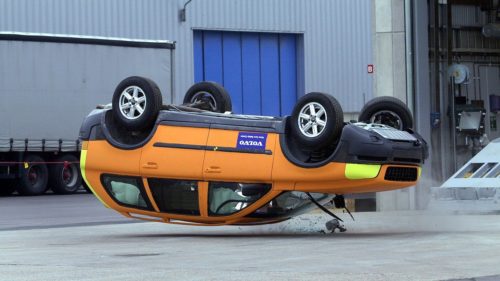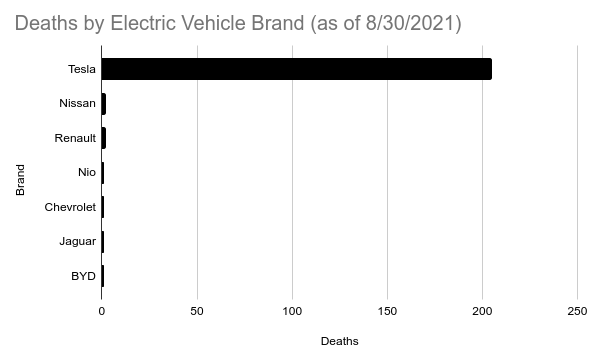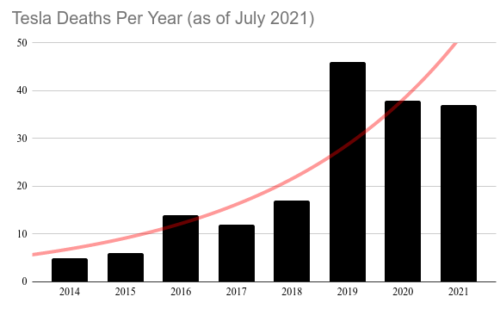The Drive has reported this as “…a lot that goes into making Volvo one of the world’s safest auto brands.”

Volvo undeniably puts safety first, above all else. They famously said a long time ago that zero deaths is their vision.
Volvo –- whose XC90 was among the nine vehicles cited by the IIHS [with death rate of zero] –- has set a corporate goal of having no one die in a crash of one of its new products by the 2020 model-year.
It stands out because this brand is superior to Tesla in every way, including innovation (because safety is valued), yet somehow Tesla has pranced around falsely claiming to be better at safety than Volvo. Remember this 2017 circus show?
“The Volvo is arguably the second-safest car in the world,” he said, eliciting laughs and applause from the audience. […] Musk has made such a comparison [with Volvo] in the past, hailing Tesla’s crash safety as the best in the world, a statement that has caught the attention of some industry veterans because Volvos have a longstanding reputation for safety. The company even has a plan to eliminate crash deaths in its new cars by 2020.
Perhaps this analysis a year earlier in 2016 says it best.
Volvo actually made this claim way back in 2008, as part of their Vision 2020 initiative; good on them for sticking to it. The initiative appears to be back in the news now because with autonomous cars a sure thing, their claim sounds less like optimism and more like certain truth. Volvo has announced, after all, that they’ll be selling autonomous cars in just four years’ time. “With the development of full autonomy we are going to push the limits of automotive safety,” Volvo safety engineer Erik Coelingh told CNN Money, “because if you make a fully autonomous vehicle you have to think through everything that potentially can happen with a car.”
Certain truth? Turns out to be the exact opposite, a hard won engineering problem. Volvo backed away from full autonomy and warned people to remain in control, while sticking to their zero deaths goal.
“We’re trending towards zero,” said Mr Rourke. “It’s a vision…that’s what we’re aiming towards.” When asked why Volvo had watered down its initial mission statement about zero deaths, Mr Rourke said: “We’re not taking a step back on anything. We’ve said this is our vision (that)…nobody will be hurt or seriously injured or killed in a brand-new Volvo in 2020. Our vision is to make it next to near impossible (to die in a new Volvo).”
Volvo’s driver assistance technology today is arguably the best, not least of all because you never hear about it in the news. It’s no lie, it just does what they say it does.
And on top of reiteration of that vision, they immediately have responded to any defect with deep analysis and course correction (far better than Tesla, which is slow to respond if at all).
Let me give a few clear examples.
Many manufacturers track zero deaths right now in popular models, despite high volume sales, achieving some of the safest records in history.
Tesla on the other hand, as a relative newcomer without having to maintain a legacy of old technology, since 2013 has earned a tragic reputation for being boastful (lying) about safety while accumulating hundreds of unnecessary deaths.
The CEO of Tesla has tried to excite his audiences by claiming magically his cars will be better than Volvo, promising his customers a false sense of being the best at safety.
Basic data shows instead he has failed miserably:

When I post this chart I often hear Tesla believers complain it doesn’t conform to their bias because it obscures sales volumes. Does it? In fact, it is the opposite. First, volume shouldn’t cause more deaths to start with (remember more cars means more data, which means more safety). Second, Tesla doesn’t have higher volume.
Nissan? Chevrolet? Jaguar? These manufacturers are far older and have far more cars on the road than Tesla. It begs the question of who learns from mistakes and who ignores them.
And who was putting electric cars on the road in 1948? Nissan. Far more cars on the road, and far more years of electric cars on the road, yet fatalities are dramatically lower.
Indeed the chart reflects Tesla has an unnecessary and blatant disregard for safety engineering compared to all the other car manufacturers. They stand out because being careless liars makes them stand out.
Look at the following table showing this year of high sales volumes for electric cars next to total deaths by model:
| Car | 2021 Sales | Total Deaths |
| Tesla Model S | 5,155 | 40 |
| Porsche Taycan | 5,367 | ZERO |
| Tesla Model X | 6,206 | 14 |
| Volkswagen ID | 6,230 | ZERO |
| Audi e-tron | 6,884 | ZERO |
| Nissan Leaf | 7,729 | 2 |
| Ford Mustang Mach-e | 12,975 | ZERO |
| Chevrolet Bolt | 20,288 | 1 |
| Tesla Model 3 | 51,510 | 87 |
Tesla clearly stands out.
I mean if volume of sales alone were some kind of excuse for deaths, or miles driven for that matter, then we should expect the Chevrolet Bolt to have nearly 40X more deaths! It doesn’t make any sense.
Consider also how the Bolt predecessor (small 4-door car called a Volt) since 2010 sold 157K cars and recorded an average of 0.7 deaths/year.
Now look again at how the Tesla Model 3 has an average of 30 deaths/year.
Volume of cars? Sorry, no. Tesla since it first hit the road has been sending a lot of people to early graves, yet it also seems to be on track to digging an ever larger graveyard.
A basic predictive model looks absolutely horrible.

Here’s a qualitative sample of the problem:
Model 3, capable of hitting 60 mph in 2.9 seconds… left the Tesla heading straight into oncoming traffic, as indicated in this photo taken from the Tesla Model 3 seconds before the crash. With the Model 3 hitting nearly 50 mph and still accelerating, the plaintiff was able to avoid the oncoming traffic, an Amish buggy and utility poles before slamming into the building [seriously injuring a woman at her desk who died two weeks later].”
A smaller, lighter, less boastful vehicle from Chevrolet has a safety record far superior than an expensive exotic luxury model from a CEO claiming to have beat Volvo in safety vision. It doesn’t make any sense.
Who looks at a tiny, inexpensive Chevrolet Bolt and thinks this thing is the top safety choice, way better than Tesla’s falsely advertised ones? The news certainly suggests they should look at it that way. The Bolt just had a total recall for a serious defect.
The latest news is just three injuries prompted the Bolt manufacturer to recall ALL of them.
Nearly a month ago General Motors announced it’s recalling every single Chevy Bolt ever made due to a potential fire risk. A defect within the battery system has so far caused 12 fires out of 147,000 Bolts produced and 3 injuries. For many brands and models, this would be a death blow.
Just three injuries. Total recall.
Speaking of fires, Tesla data shows at least 20 fatalities related to fire, and many more injuries.
Have Tesla’s fires been a “death blow” to the brand or model?
The answer is clear. Who can forget in 2016 when a test drive erupted in fire and the Tesla response was… they don’t know why and they aren’t going to investigate further.
Tesla spokesman in France said that “the fire was caused by a bolted electrical connection that had been improperly tightened.” He added that the electrical connections are normally installed by a robot, but in that particular car, the connection was installed manually. It’s unclear why the connection wasn’t done by a robot like it typically is, but the spokesman did say that there has never been a similar incident in another car.
See any difference in quality control and safety? Tesla literally used “we don’t understand” and “we can’t extrapolate” to tell people they would be ignoring a potentially serious defect.
Fast forward to 2021 and a Tesla spontaneously erupts into fire again after the company said it delayed a release for months to ensure safety.
Tesla had originally boasted with their first few thousand cars they would be the safest on the road, safer than a Volvo, and they said the more of their cars on the road would only make things even safer.
Yet only a few years later the exact opposite has happened. As the charts here have shown, the more Tesla produced, the more deaths — and it’s trivial to understand why.
Look at the Volvo team for comparison to how things should be done, and why Tesla tried to treat them as a target.
In 2014 Volvo announced automation technology to help drivers be safer by monitoring alertness.
It was low fanfare, simple in design and made sure drivers understood it was an augmentation related to drivers being in control and safe.
By 2017 Volvo was scaling back its announcements, bringing out a four-year delay, with warnings like this one:
…we are finding that there were more issues to dig into and solve than we expected…
Completely the opposite to Tesla’s CEO in 2019 literally telling people “full self-driving” already was reality that year so drivers should feel comfortable going to sleep in their cars.
Tesla boss Elon Musk says “full self-driving” cars will hit the road this year, with drivers able to sleep in their vehicles in 2020. “My guess as to when we would think it is safe for somebody to essentially fall asleep and wake up at their destination? Probably towards the end of next year,” he said. “I think we will be feature complete, full self-driving, this year — meaning the car will be able to find you in a parking lot, pick you up, and take you all the way to your destination without an intervention — this year. “I would say I am of certain of that. That is not a question mark.”
A complete lie. Absolutely not true.
Here we are in 2021 with Tesla’s “full self-driving” a widely documented safety disaster! That is not a question mark. The latest version of Tesla, despite all the miles, are veering into the wrong lanes at pedestrians and oncoming traffic, barely functioning despite being promoted as “version 10”.
Tesla deaths can only be expected to continue to rise from a combination of this kind of poor engineering with fraudulent promotional bombast.
Now back to Volvo.
A fault in their airbag design has caused a single fatality so they have quickly issued a complete recall of ALL vehicles affected.
The recall includes about 259,383 vehicles in the U.S., 7,048 in Canada and 2,475 in Mexico. The affected vehicles are the S80 sedan from the 2001 to 2006 model years and the S60 sedan from the 2001 to 2009 model years, according to a document posted to NHTSA’s website.
If that number of vehicles seems high, that’s because Volvo sells a lot of cars. And while Volvo states a clear commitment to reaching zero deaths and shows very obvious actions to achieving that laudable goal, Tesla seems only to come up with lies and excuses for why it has keeps failing — killing more and more people.
from Hacker News https://ift.tt/7oz1qEN
No comments:
Post a Comment
Note: Only a member of this blog may post a comment.